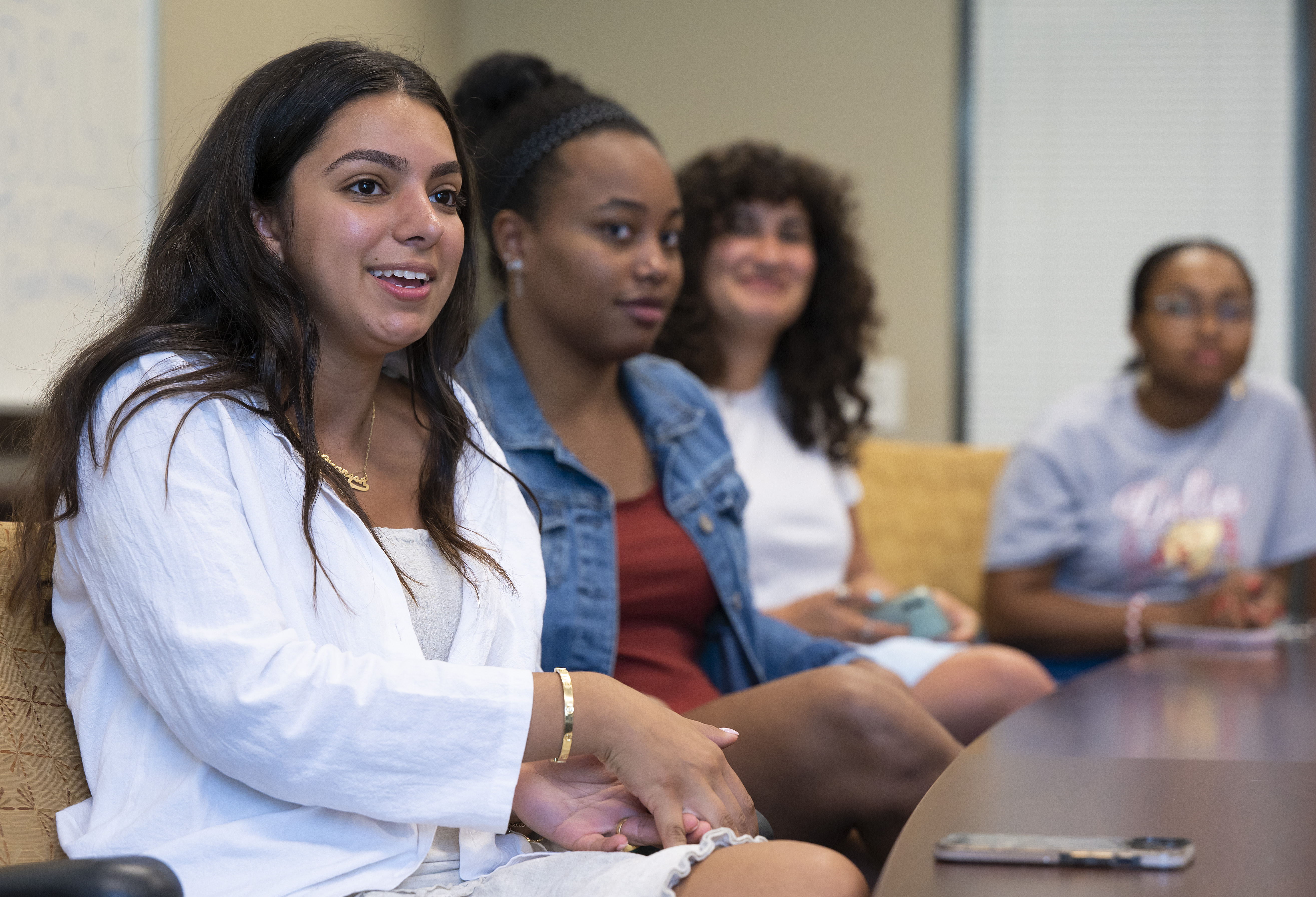Elon's Health, Equity and Racism (H.E.R.) Lab aims to address area health disparities as its work examining healthcare systems and outcomes in marginalized communities advances.
In the year since Elon’s Health, Equity and Racism Lab emerged, a firecracker cohort of undergraduates and faculty have established a hub for rigorous examination of race-based barriers to healthcare.
The years ahead promise more research, broader work in surrounding communities and expanded emphasis on advocacy and education as members work to re-imagine systems that contribute to inequities.
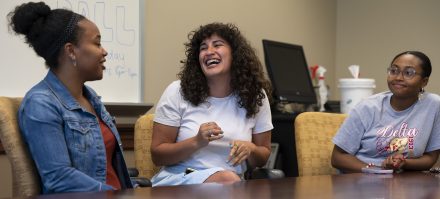
H.E.R. Lab founders Associate Professor Stephanie Baker and Assistant Professor Yanica Faustin, gathered with undergraduate lab members on April 11 — the anniversary of the lab’s launch date, chosen to commemorate the last day of National Public Health Week (formerly recognized as Negro Health Week) and the first day of Black Maternal Health Week. With Deena Elrefai ’22, Nazaneen Shokri ’24, Queen Assata Stephens ’22 and Mia Wilson ’22, the co-founders assessed progress made and strategized for the future.
Much of the lab’s research so far concerns maternal and women’s health among marginalized populations. Other aspects of minority health and inequity — including issues of environmental justice — are ripe for exploration, including by students who may not be public health studies majors.
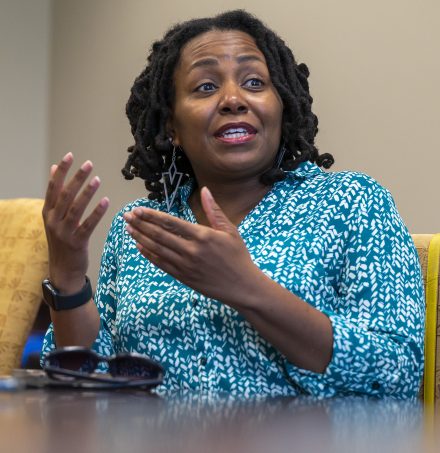
“I want the lab to be connected to the issues that are arising locally, that community members are naming,” Baker said. “We’re hearing a lot about the toxins that communities of color are being exposed to in their neighborhoods, conditions in the soil and the water. Another is access to care. When you look at life expectancy across Alamance County, there’s almost 11 years difference between the wealthiest and most disadvantaged areas. That’s significant.”
The following is a condensed version of their roundtable discussion about the mission of the H.E.R. Lab and its outlook.
What’s surprised you about the H.E.R. Lab’s first year?
Faustin: The H.E.R. Lab was something we talked about for a while before we launched it. It came out of the way we both do our research. To see it recognized across the campus was really nice. People know about us, and they ask about the H.E.R. Lab.
Baker: One thing that I didn’t anticipate with the lab was the recognition outside of Elon University. It felt like a very insular kind of thing that we were doing, but we knew it would benefit Elon. Elon is a teaching university, not an R-1 (research) institution, yet our undergraduates have great opportunities to engage in very rigorous research.
Faustin: It had legs of its own and took off faster than we maybe had anticipated, so we have been keeping up with that pace while trying to remain true to what we are and who we are.
Baker: I didn’t anticipate what it would mean to run a lab like this at a teaching institution and how you maintain the balance of what you can and can’t take on while also teaching.
Shokri: But when I joined the lab in the fall, it was so well-run and well-functioning. It felt really established. I wouldn’t have thought it had just started the semester before.
Wilson: It was a very smooth transition into what it’s become.
How has being part of this lab shaped your college experience and life plans?
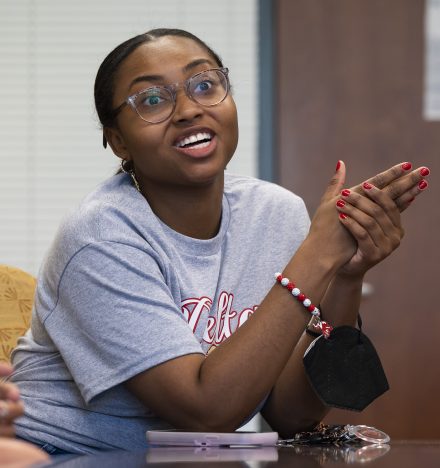
Shokri: I was most excited about coming into a community of like-minded people. I know others who study public health and others who do research, but the intersectionality between public health research and race and equity, that’s a niche group of individuals. To have us all here to support each other through our research and talk about it and expand on it is unique to me.
Elrefai: Undergraduate research at Elon can be an amazing part of your experience, but it also can be very isolated. That can make it hard to know if you’re doing it right, if you’re at the right pace or missing anything. Having a group of students, especially a group of women and a group of women of color, who are excited about research and are going into this together and able to talk to each other is just the best.
Stephens: I love the support and community that’s come from this lab. We may have had public health classes together or seen each other in passing but not really had the opportunity to know each other’s interests. Knowing what you’re researching gave me perspective because we’re not all researching the same thing. So we’re learning from each other and teaching each other, as well. It’s a great community.
Wilson: This lab gave me a lot of confidence and research opportunities that I can talk about in interviews and put in my resume. It’s given me the tools I need to succeed. A lot of our focus is on maternal and childhood health, which is something you don’t really expect to study when you start college. I ended up finding out it’s what I wanted to do. To be surrounded by other people who are also interested in these topics, and learning from amazing mentors, I don’t know if I would have gotten this opportunity somewhere else.
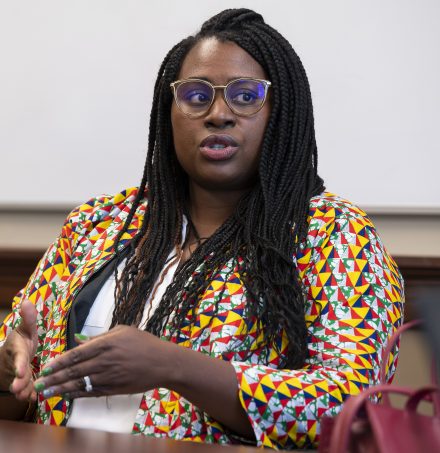
What would you tell people about this first group of undergraduate members?
Baker: They’re amazing. We couldn’t have been luckier to have such an amazing group of initial students. What I love most is that they’re each successful in their own unique ways. There’s no pressure like, “You have to be successful in my lane.” When I think about what it means to be a faculty member, it’s very rewarding when you have such amazing students who are demonstrating why you’re here.
Faustin: To be to be able to work with these students, I mean, they’re incredible. I feel honored to work with them and I learn and grow so much from them, and I learn grow so much from Stephanie and feel so lucky to have her here. We are very proud of our students. We brag on them all the time.
What’s ahead?
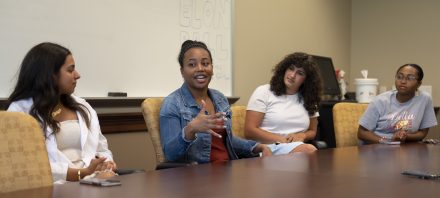
Stephens: I want the lab to grow. I want men to be interested, as well. And right now, it’s mainly BIPOC individuals in the lab, and I’d like to see more interest from our White counterparts who want to do the research and really want to understand these inequities.
Elrefai: As we get more new members joining with other members who have been there for a long time, it will be a really rich experience. It will be cool to see the student-mentorship piece take off.
Wilson: I know from running the College Coffee table, people are interested. We have sweatshirts and when I wear it, people often ask me what it’s about or tell me they’ve heard about it and want to know more.
Elrefai: We have the advocacy, capacity-building and research areas. A lot of us right now are in the research area, which is really cool. I am excited to come back and see the other areas — advocacy and capacity-building — especially with community members, so we can create meaningful outcomes and share meaningful information with people affected by inequity.
Baker: It’s really important that the H.E.R Lab becomes what it’s supposed to be. I don’t know that the way to health equity is through traditional mechanisms, so I would hope that the lab continues to be creative and innovative; that we would buck against other people’s expectations and make the contributions that we believe are important to move health equity forward.
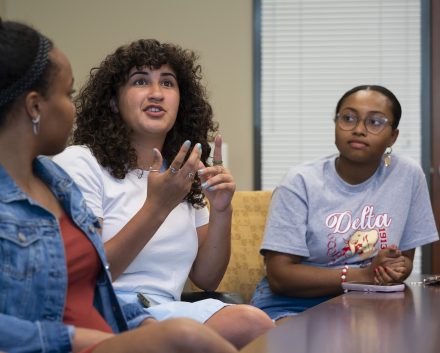
Faustin: From the very beginning, I think we’ve been very clear on what we want this to be and who we want to guide us in that process and how we want to guide others. Staying true to that is an iterative process because there are outside demands and pressures. We are in academia and “lab” can have a different definition in that sense.
Baker: My hope is that people will start learning about these issues younger and younger, so as they move into their careers, they can bring a critical, analytical lens about race and racism into wherever they are. I think it will situate them to be able to solve some of the world’s problems rather than putting Band-Aids on them.
Faustin: The mission of our lab is where my hope lies: That that mission is not necessary in the future because everyone knows and is aware of these issues, and has not just a knowledge, but the ability to apply it in that critical way. So those in the field interacting with patients or communities understand that racism is the root cause of these health inequities.
Some markers of the H.E.R. Lab’s first year include:
- Baker and Faustin mentored seven research projects involving issues around minority and marginalized communities’ access to healthcare and health outcomes.
- Nine undergraduates joined the lab: Victoria Colbeck ’23, Elrefai, Kiara Hunter ’23, Catherine Oliver ’25, Nyla Rivers ’22, Shokri, Min Stanwyck ’21, Stephens and Wilson.
- Members presented at the American Public Health Association Conference, the UNC Minority Health Conference, National Conferences on Undergraduate Research and Elon’s Intersect Conference.
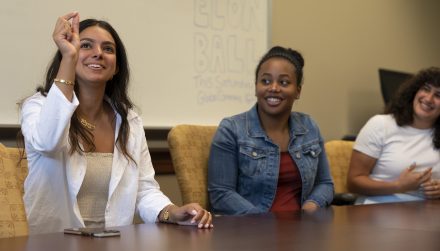
Left to right, students Nazaneen Shokri ’24, Mia Wilson ’22, and Deena Elrefai ’22 discuss their research with the H.E.R. Lab, Monday, April 11, 2022 at Elon University. (Rob Brown photo) - The lab hosted a webinar teaching the R4P framework it uses to assess issues and identify solutions. (R4P stands for remove, repair, remediate, restructure and provide. Baker and Faustin assisted in devising that framework as doctoral students at UNC Chapel Hill.)
- Members filmed and premiered “Reclaiming Power: The Black Maternal Health Crisis,” a documentary-dance film directed by Baker and Assistant Professor of Dance Keshia Wall. H.E.R. Lab members assisted with interviews and information for the documentary, and Elon dance students performed visual interpretations of various birth scenarios and outcomes. Research into Black maternal health disparities led Stephens to become a certified doula and found her own business, The Doula Queen, in 2021.
- Established a board of “visionary members” and mentors including: Deena Hayes-Greene, co-founder and managing director of the Racial Equity Institute; Vijaya Hogan, perinatal epidemiologist at UNC-Chapel Hill; Camara Phyllis Jones, presidential visiting fellow at the Yale School of Medicine in the Department of Medicine and the Office of Health Equity Research; Diane L. Rowley, professor emeritus of maternal and child health at UNC-Chapel Hill’s Gillings School of Global Public Health; and Monica Walker, a senior leader at the Racial Equity Institute.
For more information, visit HERLab.org and follow the lab on Instagram at @her_lab_elon, Twitter at @HER_Lab_Elon and Facebook at @HERLabElon.



